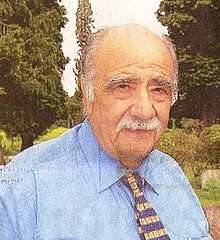Ramadan Güney
Ramadan Güney (18 February 1932 – 2 November 2006) was a British-Turkish Cypriot businessman and politician. He was the owner of Brookwood Cemetery, the largest cemetery in the United Kingdom, with the aim of establishing a Turkish cemetery.[1][2][3] Güney was also the founder and chairman of the UK Turkish Islamic Trust and had established the first Turkish mosque in London, Shacklewell Lane Mosque, in 1977.[4][5]

He was also a founding member of the VOLKAN organisation in Cyprus, established in the 1950s as part of the struggle against the Greek Cypriot nationalists, EOKA. He was in later years a Member of Parliament and presidential candidate in Northern Cyprus.[6]
Life

Güney was born in Paphos, Cyprus in 1932 to Turkish Cypriot parents.[6] After leaving school, he served in the British army and police on the island. However, in 1955, with the rise of EOKA Greek Cypriots fought a violent campaign for the end of British rule as well as for union with Greece (enosis); Güney fought against this by becoming a founding member of the Volkan organisation.[6] In 1958 he emigrated to Britain where he set up a music publishing business and became a millionaire at the age of 35.[7] In 1977 he helped found and run the first Turkish Cypriot mosque in London, called the Shacklewell Lane Mosque, and worked on a variety of social and community projects, arising from his work with the UK Turkish Islamic Centre.[4]
He acquired Brookwood Cemetery in 1985, the purchase evolving from Güney's role as Chairman of the UK Turkish Islamic Trust, which wanted suitable burial facilities for its members.[4] He died at the age of 74 in Northern Cyprus, due to a heart attack.[1] Following a service at his mosque in London, he was buried in his family vault at Brookwood Cemetery on Friday 10 November 2006.[4]
Personal life
Güney was married to Süheyla Güney who died in 1992.[1] They had two sons and four daughters from this marriage.[1][4]
Diane Holliday was Güney's partner of 6 years before his death.[8] In 2011, the inheritance of the cemetery was successfully challenged by Diane Holliday and her adult son from a previous marriage, Kevin.[9]
References
- Daily Mail (6 March 2010). "The mysterious case of the blonde, the millionaire cemetery owner and the 'hitman'". London. Retrieved 16 September 2011.
- London Evening Standard. "Son's anger as court awards his father's fortune to ex lover". Retrieved 16 September 2011.
- Ansari, Humayun (2007), "'Burying the dead': making Muslim space in Britain", Historical Research, Blackwell Publishing, 80 (210): 563, doi:10.1111/j.1468-2281.2007.00432.x
- Brookwood Cemetery. "Ramadan H. Guney: 1932-2006". Archived from the original on 27 September 2011. Retrieved 16 September 2011.
- Çoştu, Yakup (2004), "Londra'da Türklere Ait Dini Organizasyonlar" (PDF), Hitit Üniversitesi İlahiyat Fakültesi Dergisi, Hitit University, 8 (16): 87, archived from the original (PDF) on 17 March 2012
- Milliyet. "'Mezar kralı Türk' öldü". Retrieved 16 September 2011.
- Acik Gazete. "Ramadan Güney'in davası Eylül'de". Retrieved 16 September 2011.
- Musa & Ors v Holliday & Ors (2012) EWCA Civ 1268
- Joe Finnerty (14 October 2012). "Brookwood Cemetery dispute finally resolved". getsurrey.